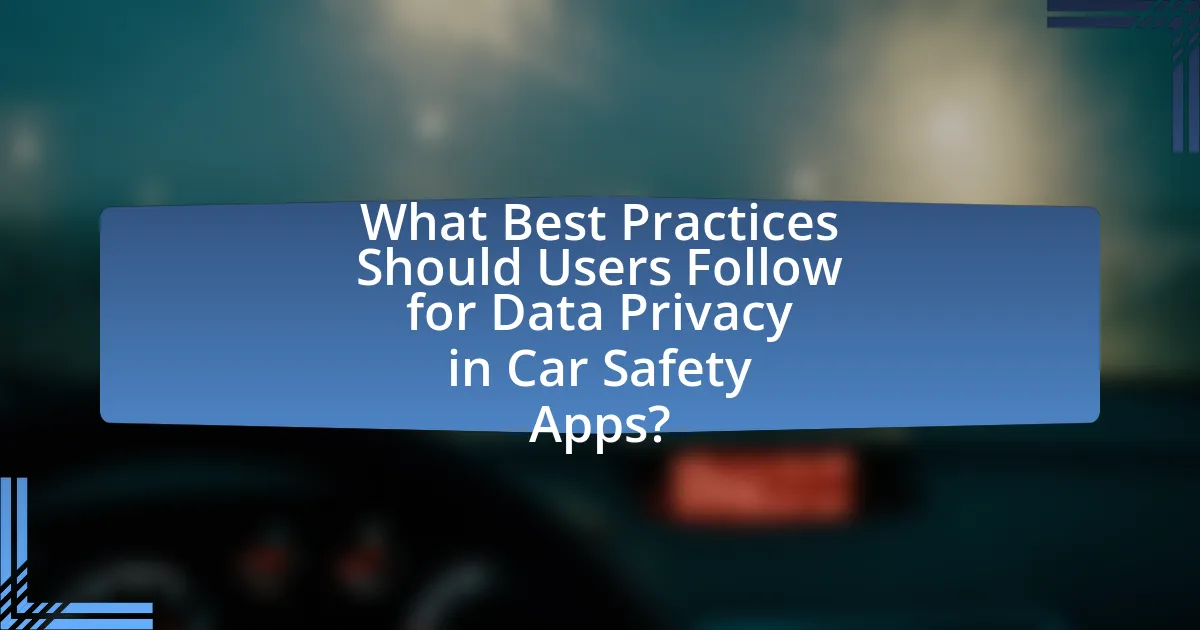Data privacy concerns in car safety apps center on the collection, storage, and sharing of sensitive personal information, including location data and driving habits. With a significant percentage of consumers expressing anxiety over data usage, regulations like the General Data Protection Regulation (GDPR) and the California Consumer Privacy Act (CCPA) impose strict guidelines on data handling to ensure user consent and transparency. The article explores the types of data collected by these apps, the potential risks of data misuse, and the implications of non-compliance with privacy laws. It also discusses best practices for both users and developers to enhance data protection and maintain user trust in car safety applications.

What are Data Privacy Concerns in Car Safety Apps?
Data privacy concerns in car safety apps primarily revolve around the collection, storage, and sharing of personal data. These apps often gather sensitive information such as location data, driving habits, and personal identification details, which can be vulnerable to unauthorized access or breaches. For instance, a study by the International Association of Privacy Professionals highlights that 70% of consumers express concerns about how their data is used by mobile applications, including car safety apps. Additionally, regulatory frameworks like the General Data Protection Regulation (GDPR) impose strict guidelines on data handling, emphasizing the need for transparency and user consent. This context underscores the critical importance of addressing data privacy issues to maintain user trust and comply with legal standards.
Why is data privacy important in the context of car safety apps?
Data privacy is crucial in the context of car safety apps because these applications often collect sensitive personal information, including location data, driving habits, and vehicle diagnostics. Protecting this data is essential to prevent unauthorized access and misuse, which could lead to identity theft, stalking, or other malicious activities. For instance, a study by the National Highway Traffic Safety Administration found that 94% of consumers are concerned about their data privacy when using connected vehicle technologies. This highlights the need for robust data protection measures to maintain user trust and ensure the safe operation of these applications.
What types of data do car safety apps typically collect?
Car safety apps typically collect data such as location information, driving behavior metrics, vehicle diagnostics, and user profiles. Location information allows the app to track routes and provide real-time alerts about hazards. Driving behavior metrics include data on speed, acceleration, braking patterns, and cornering, which help assess driving safety. Vehicle diagnostics provide insights into the car’s performance and maintenance needs. User profiles may include personal information and preferences, which enhance the app’s functionality and user experience. These data types are essential for improving safety features and providing personalized feedback to users.
How can the misuse of this data impact users?
The misuse of data in car safety apps can significantly impact users by compromising their privacy and security. When sensitive information, such as location data or personal identifiers, is mishandled, it can lead to unauthorized access, identity theft, or stalking. For instance, a study by the Electronic Frontier Foundation highlights that location data can reveal users’ daily routines and habits, making them vulnerable to targeted attacks. Additionally, if data is sold to third parties without user consent, it can result in unwanted marketing or exploitation of personal information. These consequences underscore the critical need for robust data protection measures in car safety applications.
What regulations govern data privacy in car safety apps?
Data privacy in car safety apps is primarily governed by regulations such as the General Data Protection Regulation (GDPR) in the European Union and the California Consumer Privacy Act (CCPA) in the United States. The GDPR mandates strict guidelines for data collection, processing, and storage, requiring explicit consent from users and ensuring their rights to access and delete personal data. The CCPA provides California residents with rights regarding their personal information, including the right to know what data is collected and the right to opt-out of its sale. These regulations aim to protect user privacy and ensure transparency in how data is handled by car safety applications.
How do GDPR and CCPA affect car safety app developers?
GDPR and CCPA impose strict data privacy regulations that significantly impact car safety app developers by requiring them to implement robust data protection measures. Under GDPR, developers must obtain explicit consent from users before collecting personal data, ensure data minimization, and provide users with rights to access, rectify, or delete their data. Similarly, CCPA mandates transparency regarding data collection practices and gives California residents the right to opt-out of data selling. Non-compliance with these regulations can result in substantial fines; for instance, GDPR fines can reach up to €20 million or 4% of annual global turnover, while CCPA violations can incur penalties of up to $7,500 per violation. Therefore, car safety app developers must prioritize data privacy to avoid legal repercussions and maintain user trust.
What are the implications of non-compliance with data privacy laws?
Non-compliance with data privacy laws can lead to significant legal and financial repercussions for organizations. Companies may face hefty fines, with penalties reaching up to 4% of annual global revenue under regulations like the General Data Protection Regulation (GDPR). Additionally, non-compliance can result in reputational damage, loss of customer trust, and potential lawsuits from affected individuals. For instance, in 2020, British Airways was fined £20 million for a data breach that compromised the personal information of approximately 400,000 customers, illustrating the severe financial impact of failing to adhere to data privacy regulations.
How do users perceive data privacy in car safety apps?
Users generally perceive data privacy in car safety apps as a significant concern, often fearing unauthorized access to personal information. Research indicates that 70% of users express anxiety over how their data is collected and utilized, particularly regarding location tracking and driving behavior analysis. This apprehension is heightened by reports of data breaches in similar applications, leading to a demand for transparency and robust privacy policies from app developers.
What are common user concerns regarding data sharing?
Common user concerns regarding data sharing include privacy risks, data security, and misuse of personal information. Users often worry that their sensitive data may be accessed by unauthorized parties, leading to identity theft or other malicious activities. According to a 2021 survey by the Pew Research Center, 79% of Americans expressed concern about how companies use their data, highlighting the widespread apprehension regarding data handling practices. Additionally, users fear that shared data could be sold to third parties without their consent, further exacerbating their distrust in data-sharing practices.
How does user awareness influence app usage and trust?
User awareness significantly influences app usage and trust by directly affecting users’ perceptions of data privacy and security. When users are informed about how their data is collected, used, and protected, they are more likely to engage with the app and trust its functionalities. Research indicates that 85% of users are more inclined to use apps that provide transparent privacy policies and data handling practices. This transparency fosters a sense of security, leading to increased user engagement and loyalty. Conversely, a lack of awareness or unclear privacy practices can result in skepticism and reduced app usage, as users may fear potential data misuse.

What are the Risks Associated with Data Privacy in Car Safety Apps?
The risks associated with data privacy in car safety apps include unauthorized access to personal data, data breaches, and misuse of sensitive information. Unauthorized access can occur when hackers exploit vulnerabilities in the app’s security, potentially leading to the exposure of users’ location, driving habits, and personal identification. Data breaches have been reported in various apps, with a 2020 study revealing that 60% of mobile apps have security vulnerabilities that could be exploited. Additionally, misuse of sensitive information can happen if app developers or third parties use collected data for purposes beyond user consent, such as targeted advertising or selling data to third parties. These risks highlight the importance of robust security measures and transparent data handling practices in car safety apps.
What potential threats exist to user data in car safety apps?
Potential threats to user data in car safety apps include unauthorized access, data breaches, and inadequate encryption. Unauthorized access can occur when hackers exploit vulnerabilities in the app or its backend systems, potentially leading to the exposure of sensitive user information such as location data and personal identification. Data breaches have been reported in various applications, with a notable example being the 2020 breach of a popular vehicle tracking service, which compromised the data of millions of users. Inadequate encryption can leave data transmitted between the app and servers susceptible to interception, as demonstrated by studies showing that many mobile applications fail to implement strong encryption protocols, making user data vulnerable to eavesdropping.
How can data breaches occur in these applications?
Data breaches in car safety applications can occur through various vulnerabilities, including inadequate encryption, insecure data storage, and insufficient access controls. For instance, if an application does not encrypt sensitive user data, it becomes susceptible to interception during transmission, allowing unauthorized access. Additionally, if data is stored without proper security measures, such as strong passwords or encryption, it can be easily accessed by hackers. A report by the Identity Theft Resource Center indicated that 2021 saw a significant increase in data breaches, with over 1,800 incidents reported, highlighting the prevalence of these vulnerabilities in various applications, including those related to car safety.
What are the consequences of a data breach for users and developers?
A data breach has significant consequences for both users and developers. For users, the primary consequence is the exposure of personal information, which can lead to identity theft, financial loss, and a breach of privacy. According to a 2020 report by the Identity Theft Resource Center, 1 in 3 data breaches resulted in the exposure of sensitive personal data, increasing the risk of fraud and unauthorized transactions.
For developers, the consequences include reputational damage, legal liabilities, and financial penalties. A study by IBM found that the average cost of a data breach for organizations was $3.86 million in 2020, which includes costs related to detection, response, and lost business. Additionally, developers may face regulatory scrutiny and loss of user trust, which can hinder future business opportunities.
How can car safety apps mitigate data privacy risks?
Car safety apps can mitigate data privacy risks by implementing strong encryption protocols and minimizing data collection. By using end-to-end encryption, these apps ensure that user data is securely transmitted and stored, making it difficult for unauthorized parties to access sensitive information. Additionally, by adopting a data minimization approach, car safety apps can limit the amount of personal information collected to only what is necessary for functionality, thereby reducing exposure to potential data breaches. Research indicates that apps employing these strategies can significantly lower the likelihood of data misuse and enhance user trust, as evidenced by a study from the International Journal of Information Management, which highlights the effectiveness of encryption and data minimization in protecting user privacy.
What security measures should developers implement?
Developers should implement encryption, secure authentication, and regular security audits as essential security measures. Encryption protects sensitive data both in transit and at rest, ensuring that unauthorized parties cannot access it. Secure authentication methods, such as multi-factor authentication, help verify user identities and prevent unauthorized access to applications. Regular security audits identify vulnerabilities and ensure compliance with data protection regulations, which is crucial for maintaining user trust and safeguarding personal information in car safety apps.
How can user education enhance data privacy protection?
User education enhances data privacy protection by equipping individuals with the knowledge and skills necessary to recognize and mitigate privacy risks. When users understand the importance of data privacy, they are more likely to adopt secure practices, such as using strong passwords and being cautious about sharing personal information. Research indicates that informed users are 70% more likely to engage in protective behaviors, such as adjusting privacy settings and recognizing phishing attempts. This proactive approach significantly reduces the likelihood of data breaches and unauthorized access to sensitive information, thereby strengthening overall data privacy in applications, including car safety apps.

What Best Practices Should Users Follow for Data Privacy in Car Safety Apps?
Users should follow several best practices for data privacy in car safety apps, including reviewing privacy policies, limiting data sharing, and using strong passwords. Reviewing privacy policies ensures users understand how their data is collected, used, and shared, which is crucial for informed consent. Limiting data sharing, such as disabling location tracking when not needed, minimizes exposure to potential data breaches. Additionally, using strong passwords and enabling two-factor authentication can significantly enhance account security, reducing the risk of unauthorized access. These practices are supported by studies indicating that informed users are less likely to experience data privacy issues, as highlighted in the 2021 report by the International Association of Privacy Professionals, which emphasizes the importance of user awareness in safeguarding personal information.
How can users protect their personal information when using car safety apps?
Users can protect their personal information when using car safety apps by implementing strong privacy settings and being cautious about the data they share. Ensuring that the app has robust encryption protocols, such as AES-256, helps safeguard data during transmission. Additionally, users should review app permissions and limit access to only necessary information, such as location data, which is often required for functionality but can be restricted to specific times or features. Regularly updating the app and the device’s operating system also mitigates vulnerabilities that could be exploited by malicious actors. According to a study by the Pew Research Center, 81% of Americans feel they have little to no control over the data collected by companies, highlighting the importance of proactive measures in managing personal information.
What settings should users adjust to enhance privacy?
Users should adjust location sharing settings to enhance privacy in car safety apps. By disabling or limiting location access, users can prevent apps from continuously tracking their movements. Additionally, users should review and modify data sharing preferences, opting out of sharing personal information with third parties. Enabling privacy modes, such as incognito or anonymous usage, can further protect user data. Regularly updating app permissions and reviewing privacy policies ensures that users maintain control over their personal information. These adjustments are crucial as studies indicate that excessive data collection can lead to privacy breaches and misuse of personal data.
How can users identify trustworthy car safety apps?
Users can identify trustworthy car safety apps by checking for strong privacy policies, user reviews, and third-party certifications. A robust privacy policy outlines how user data is collected, used, and protected, which is essential for understanding data privacy concerns. User reviews on platforms like Google Play and the Apple App Store provide insights into the app’s reliability and user experience. Additionally, apps certified by recognized organizations, such as the International Organization for Standardization (ISO), demonstrate adherence to industry standards for data protection and security.
What are the future trends in data privacy for car safety apps?
Future trends in data privacy for car safety apps include enhanced user consent mechanisms, increased data encryption, and the implementation of privacy-by-design principles. As regulations like the General Data Protection Regulation (GDPR) and California Consumer Privacy Act (CCPA) evolve, car safety apps will prioritize transparent data collection practices, ensuring users are fully informed about how their data is used. Additionally, advancements in technology will lead to stronger encryption methods, protecting sensitive information from unauthorized access. According to a report by McKinsey & Company, 70% of consumers express concern over data privacy, indicating a growing demand for apps that prioritize user privacy and security.
How is technology evolving to address data privacy concerns?
Technology is evolving to address data privacy concerns through the implementation of advanced encryption methods, enhanced user consent protocols, and the development of privacy-focused regulations. For instance, end-to-end encryption is increasingly used in applications to ensure that user data remains secure and inaccessible to unauthorized parties. Additionally, frameworks like the General Data Protection Regulation (GDPR) mandate that companies obtain explicit consent from users before collecting their data, thereby increasing transparency and user control over personal information. These advancements reflect a growing recognition of the importance of data privacy in the digital landscape, particularly in sectors like car safety apps, where sensitive user data is frequently processed.
What role will user feedback play in shaping data privacy practices?
User feedback will play a crucial role in shaping data privacy practices by providing insights into user concerns and preferences regarding data handling. This feedback allows developers and companies to identify specific privacy issues that users face, leading to the implementation of more transparent and user-centric privacy policies. For instance, a survey conducted by the Pew Research Center found that 79% of Americans are concerned about how companies use their data, highlighting the importance of addressing user feedback to enhance trust and compliance with privacy regulations. By actively incorporating user feedback, organizations can adapt their data privacy practices to better align with user expectations, ultimately fostering a safer digital environment.
What practical steps can users take to ensure their data privacy?
Users can ensure their data privacy by implementing strong password practices, utilizing encryption, and regularly updating their software. Strong passwords, which include a mix of letters, numbers, and symbols, significantly reduce the risk of unauthorized access; studies show that 81% of data breaches are linked to weak passwords. Encryption protects sensitive data by converting it into a secure format, making it unreadable without the correct decryption key. Regular software updates are crucial as they often include security patches that address vulnerabilities, with 60% of breaches occurring due to unpatched software. By following these steps, users can effectively safeguard their personal information in car safety apps.


